Organisations: Leadership and Management Report - LSBM102 Module
VerifiedAdded on 2023/01/12
|13
|4794
|64
Report
AI Summary
This report delves into the crucial aspects of leadership and management within organizations, emphasizing their roles in achieving goals and objectives. It examines the interplay between leadership, focused on influencing and vision-setting, and management, concerned with operational efficiency. The report highlights the NHS Leadership Academy as a case study, analyzing its leadership development programs and philosophies aimed at enhancing leadership skills and behaviors to improve patient care and outcomes. It discusses various leadership and management theories, including contingency and trait theories, and their practical applications. The report also contrasts leadership and management functions, highlighting their similarities in driving organizational success. Furthermore, it evaluates the NHS leadership development programs in terms of eligibility, benefits, and their impact on both individuals and the organization, offering a comprehensive overview of leadership and management practices.
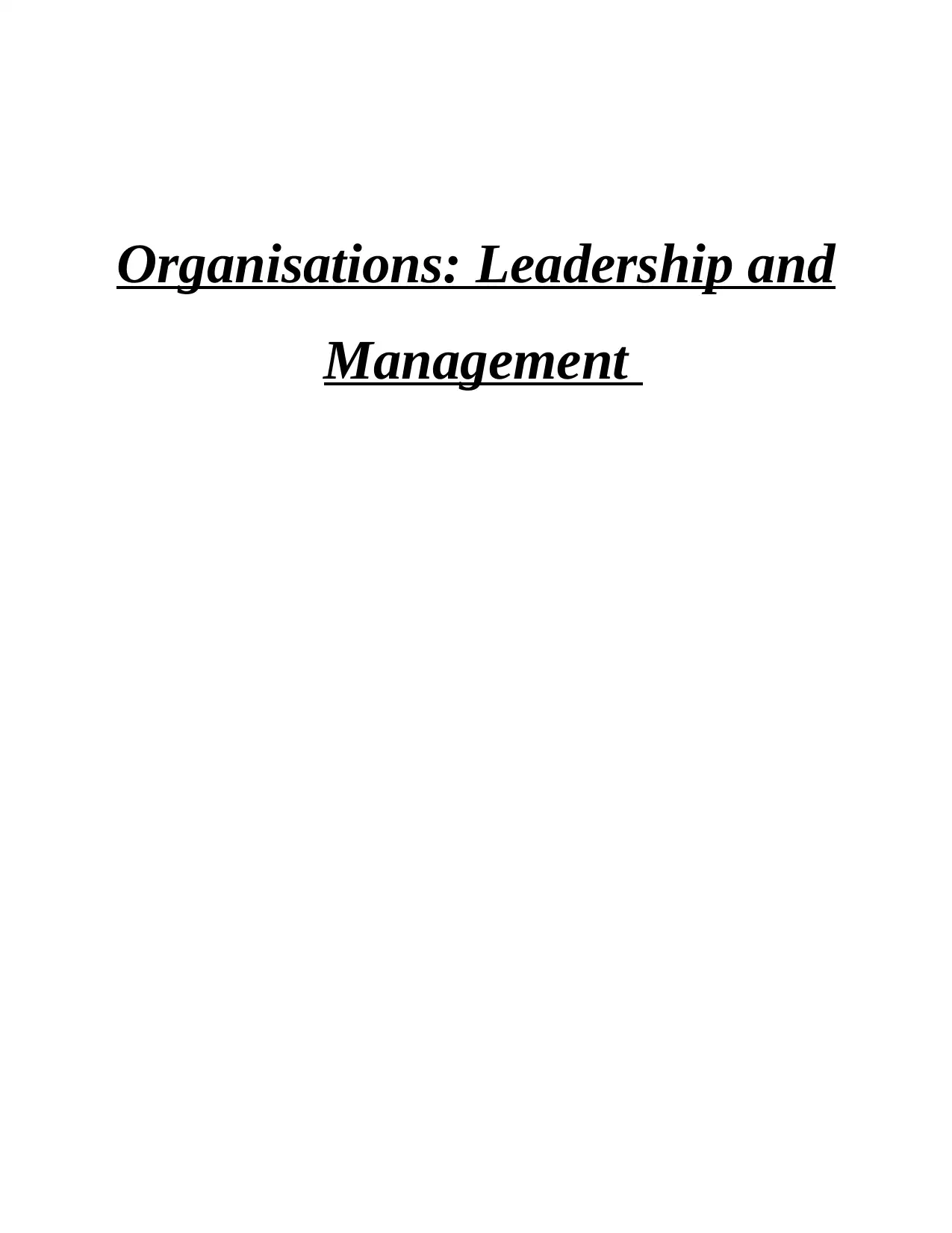
Organisations: Leadership and
Management
Management
Paraphrase This Document
Need a fresh take? Get an instant paraphrase of this document with our AI Paraphraser
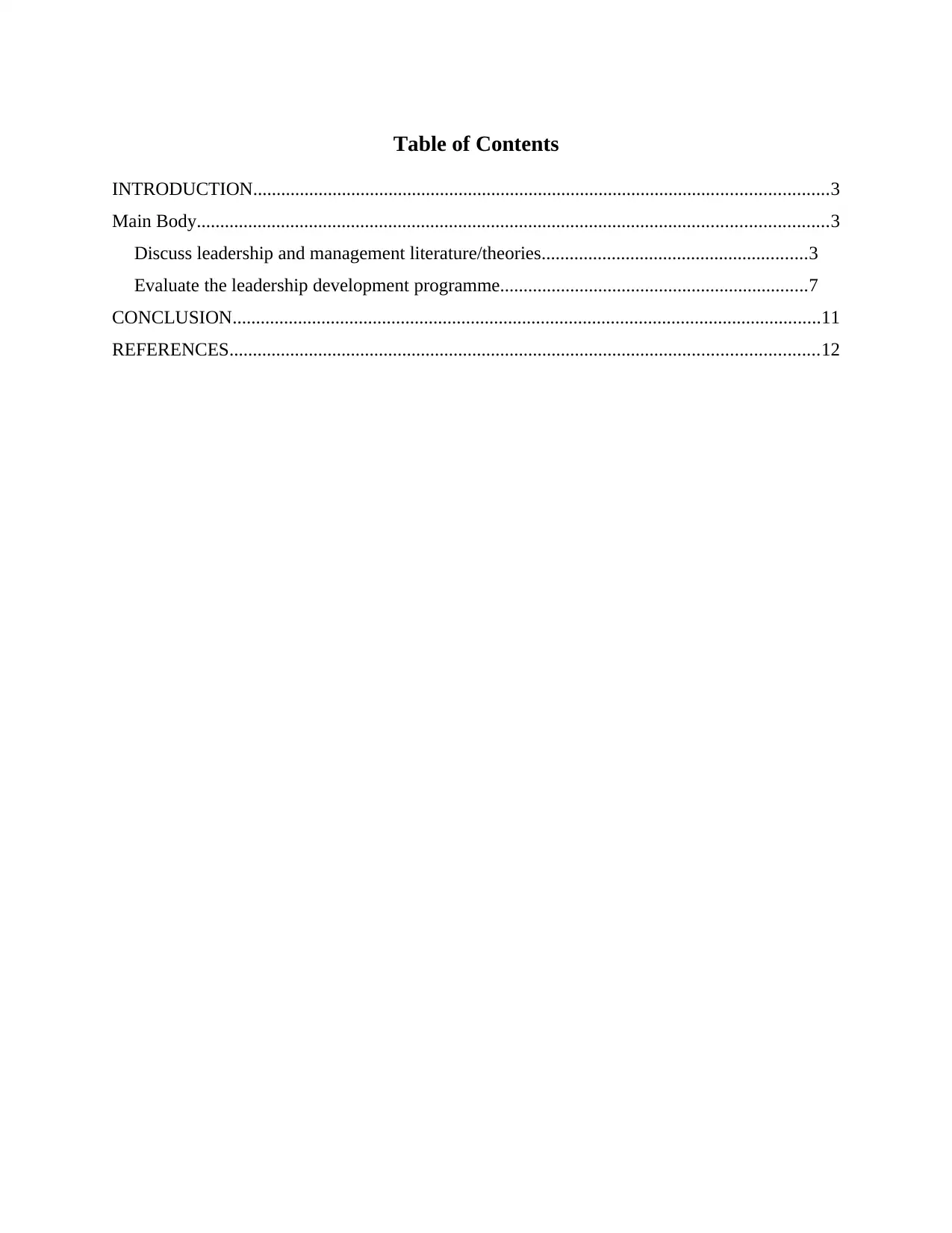
Table of Contents
INTRODUCTION...........................................................................................................................3
Main Body.......................................................................................................................................3
Discuss leadership and management literature/theories.........................................................3
Evaluate the leadership development programme..................................................................7
CONCLUSION..............................................................................................................................11
REFERENCES..............................................................................................................................12
INTRODUCTION...........................................................................................................................3
Main Body.......................................................................................................................................3
Discuss leadership and management literature/theories.........................................................3
Evaluate the leadership development programme..................................................................7
CONCLUSION..............................................................................................................................11
REFERENCES..............................................................................................................................12
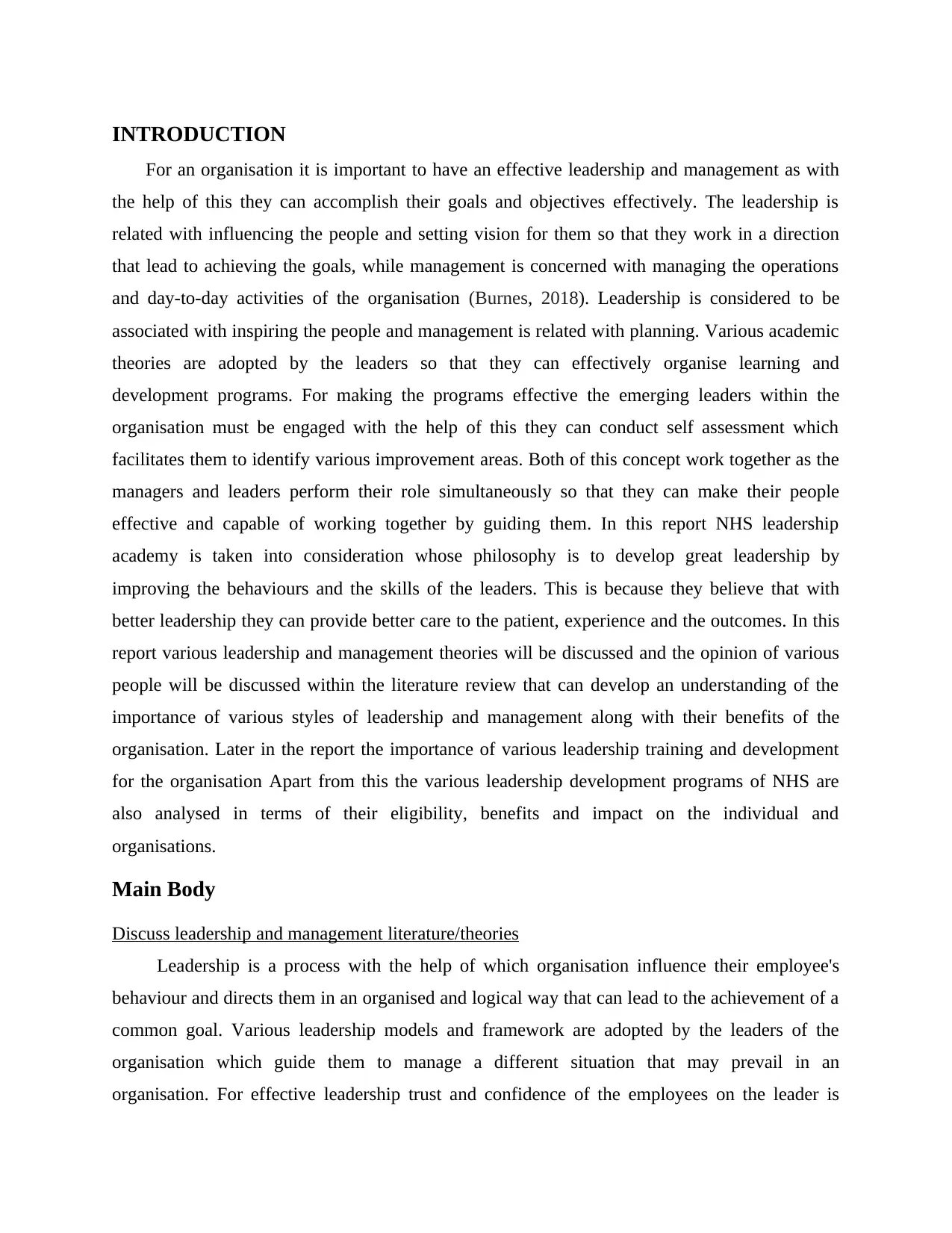
INTRODUCTION
For an organisation it is important to have an effective leadership and management as with
the help of this they can accomplish their goals and objectives effectively. The leadership is
related with influencing the people and setting vision for them so that they work in a direction
that lead to achieving the goals, while management is concerned with managing the operations
and day-to-day activities of the organisation (Burnes, 2018). Leadership is considered to be
associated with inspiring the people and management is related with planning. Various academic
theories are adopted by the leaders so that they can effectively organise learning and
development programs. For making the programs effective the emerging leaders within the
organisation must be engaged with the help of this they can conduct self assessment which
facilitates them to identify various improvement areas. Both of this concept work together as the
managers and leaders perform their role simultaneously so that they can make their people
effective and capable of working together by guiding them. In this report NHS leadership
academy is taken into consideration whose philosophy is to develop great leadership by
improving the behaviours and the skills of the leaders. This is because they believe that with
better leadership they can provide better care to the patient, experience and the outcomes. In this
report various leadership and management theories will be discussed and the opinion of various
people will be discussed within the literature review that can develop an understanding of the
importance of various styles of leadership and management along with their benefits of the
organisation. Later in the report the importance of various leadership training and development
for the organisation Apart from this the various leadership development programs of NHS are
also analysed in terms of their eligibility, benefits and impact on the individual and
organisations.
Main Body
Discuss leadership and management literature/theories
Leadership is a process with the help of which organisation influence their employee's
behaviour and directs them in an organised and logical way that can lead to the achievement of a
common goal. Various leadership models and framework are adopted by the leaders of the
organisation which guide them to manage a different situation that may prevail in an
organisation. For effective leadership trust and confidence of the employees on the leader is
For an organisation it is important to have an effective leadership and management as with
the help of this they can accomplish their goals and objectives effectively. The leadership is
related with influencing the people and setting vision for them so that they work in a direction
that lead to achieving the goals, while management is concerned with managing the operations
and day-to-day activities of the organisation (Burnes, 2018). Leadership is considered to be
associated with inspiring the people and management is related with planning. Various academic
theories are adopted by the leaders so that they can effectively organise learning and
development programs. For making the programs effective the emerging leaders within the
organisation must be engaged with the help of this they can conduct self assessment which
facilitates them to identify various improvement areas. Both of this concept work together as the
managers and leaders perform their role simultaneously so that they can make their people
effective and capable of working together by guiding them. In this report NHS leadership
academy is taken into consideration whose philosophy is to develop great leadership by
improving the behaviours and the skills of the leaders. This is because they believe that with
better leadership they can provide better care to the patient, experience and the outcomes. In this
report various leadership and management theories will be discussed and the opinion of various
people will be discussed within the literature review that can develop an understanding of the
importance of various styles of leadership and management along with their benefits of the
organisation. Later in the report the importance of various leadership training and development
for the organisation Apart from this the various leadership development programs of NHS are
also analysed in terms of their eligibility, benefits and impact on the individual and
organisations.
Main Body
Discuss leadership and management literature/theories
Leadership is a process with the help of which organisation influence their employee's
behaviour and directs them in an organised and logical way that can lead to the achievement of a
common goal. Various leadership models and framework are adopted by the leaders of the
organisation which guide them to manage a different situation that may prevail in an
organisation. For effective leadership trust and confidence of the employees on the leader is
⊘ This is a preview!⊘
Do you want full access?
Subscribe today to unlock all pages.

Trusted by 1+ million students worldwide
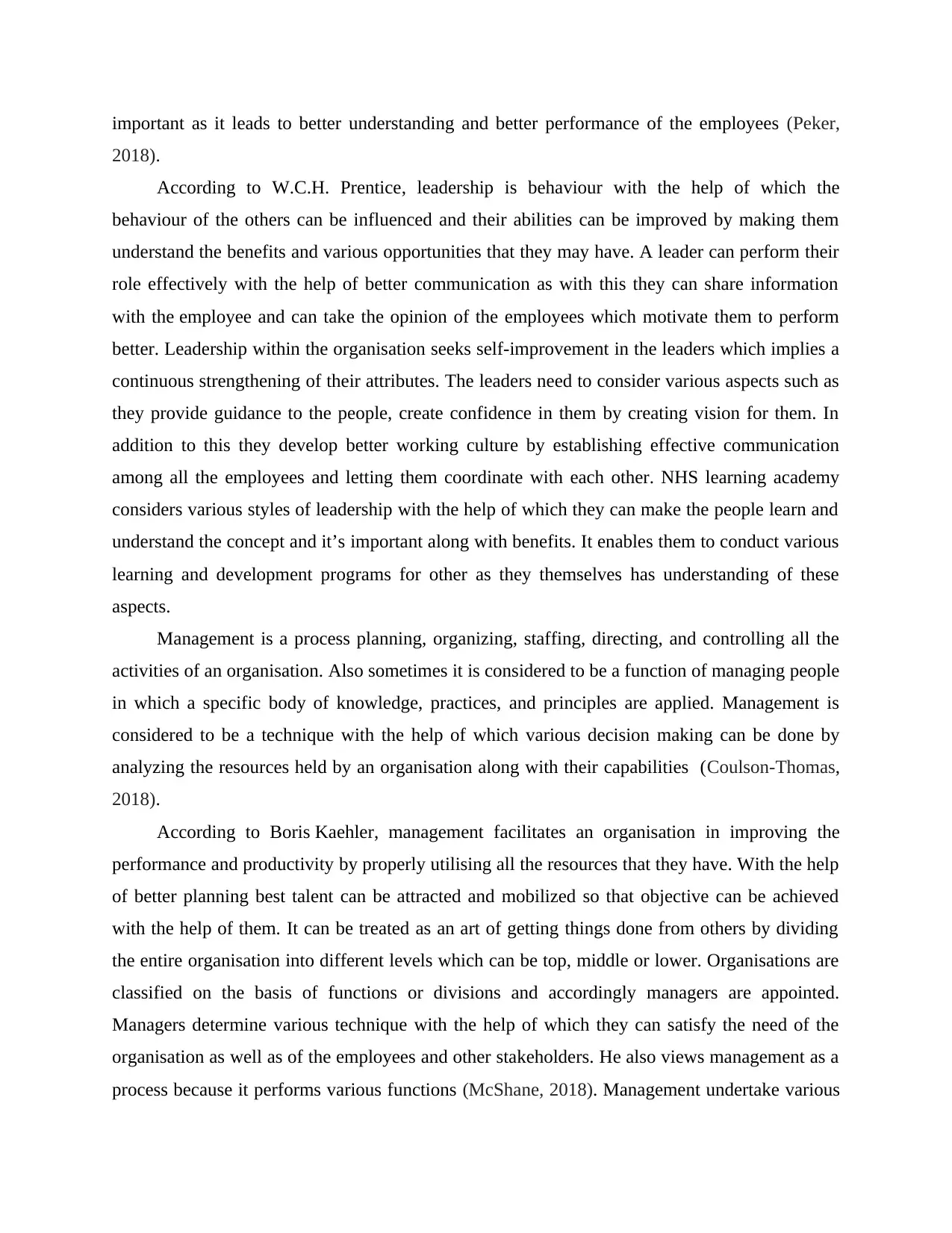
important as it leads to better understanding and better performance of the employees (Peker,
2018).
According to W.C.H. Prentice, leadership is behaviour with the help of which the
behaviour of the others can be influenced and their abilities can be improved by making them
understand the benefits and various opportunities that they may have. A leader can perform their
role effectively with the help of better communication as with this they can share information
with the employee and can take the opinion of the employees which motivate them to perform
better. Leadership within the organisation seeks self-improvement in the leaders which implies a
continuous strengthening of their attributes. The leaders need to consider various aspects such as
they provide guidance to the people, create confidence in them by creating vision for them. In
addition to this they develop better working culture by establishing effective communication
among all the employees and letting them coordinate with each other. NHS learning academy
considers various styles of leadership with the help of which they can make the people learn and
understand the concept and it’s important along with benefits. It enables them to conduct various
learning and development programs for other as they themselves has understanding of these
aspects.
Management is a process planning, organizing, staffing, directing, and controlling all the
activities of an organisation. Also sometimes it is considered to be a function of managing people
in which a specific body of knowledge, practices, and principles are applied. Management is
considered to be a technique with the help of which various decision making can be done by
analyzing the resources held by an organisation along with their capabilities (Coulson-Thomas,
2018).
According to Boris Kaehler, management facilitates an organisation in improving the
performance and productivity by properly utilising all the resources that they have. With the help
of better planning best talent can be attracted and mobilized so that objective can be achieved
with the help of them. It can be treated as an art of getting things done from others by dividing
the entire organisation into different levels which can be top, middle or lower. Organisations are
classified on the basis of functions or divisions and accordingly managers are appointed.
Managers determine various technique with the help of which they can satisfy the need of the
organisation as well as of the employees and other stakeholders. He also views management as a
process because it performs various functions (McShane, 2018). Management undertake various
2018).
According to W.C.H. Prentice, leadership is behaviour with the help of which the
behaviour of the others can be influenced and their abilities can be improved by making them
understand the benefits and various opportunities that they may have. A leader can perform their
role effectively with the help of better communication as with this they can share information
with the employee and can take the opinion of the employees which motivate them to perform
better. Leadership within the organisation seeks self-improvement in the leaders which implies a
continuous strengthening of their attributes. The leaders need to consider various aspects such as
they provide guidance to the people, create confidence in them by creating vision for them. In
addition to this they develop better working culture by establishing effective communication
among all the employees and letting them coordinate with each other. NHS learning academy
considers various styles of leadership with the help of which they can make the people learn and
understand the concept and it’s important along with benefits. It enables them to conduct various
learning and development programs for other as they themselves has understanding of these
aspects.
Management is a process planning, organizing, staffing, directing, and controlling all the
activities of an organisation. Also sometimes it is considered to be a function of managing people
in which a specific body of knowledge, practices, and principles are applied. Management is
considered to be a technique with the help of which various decision making can be done by
analyzing the resources held by an organisation along with their capabilities (Coulson-Thomas,
2018).
According to Boris Kaehler, management facilitates an organisation in improving the
performance and productivity by properly utilising all the resources that they have. With the help
of better planning best talent can be attracted and mobilized so that objective can be achieved
with the help of them. It can be treated as an art of getting things done from others by dividing
the entire organisation into different levels which can be top, middle or lower. Organisations are
classified on the basis of functions or divisions and accordingly managers are appointed.
Managers determine various technique with the help of which they can satisfy the need of the
organisation as well as of the employees and other stakeholders. He also views management as a
process because it performs various functions (McShane, 2018). Management undertake various
Paraphrase This Document
Need a fresh take? Get an instant paraphrase of this document with our AI Paraphraser
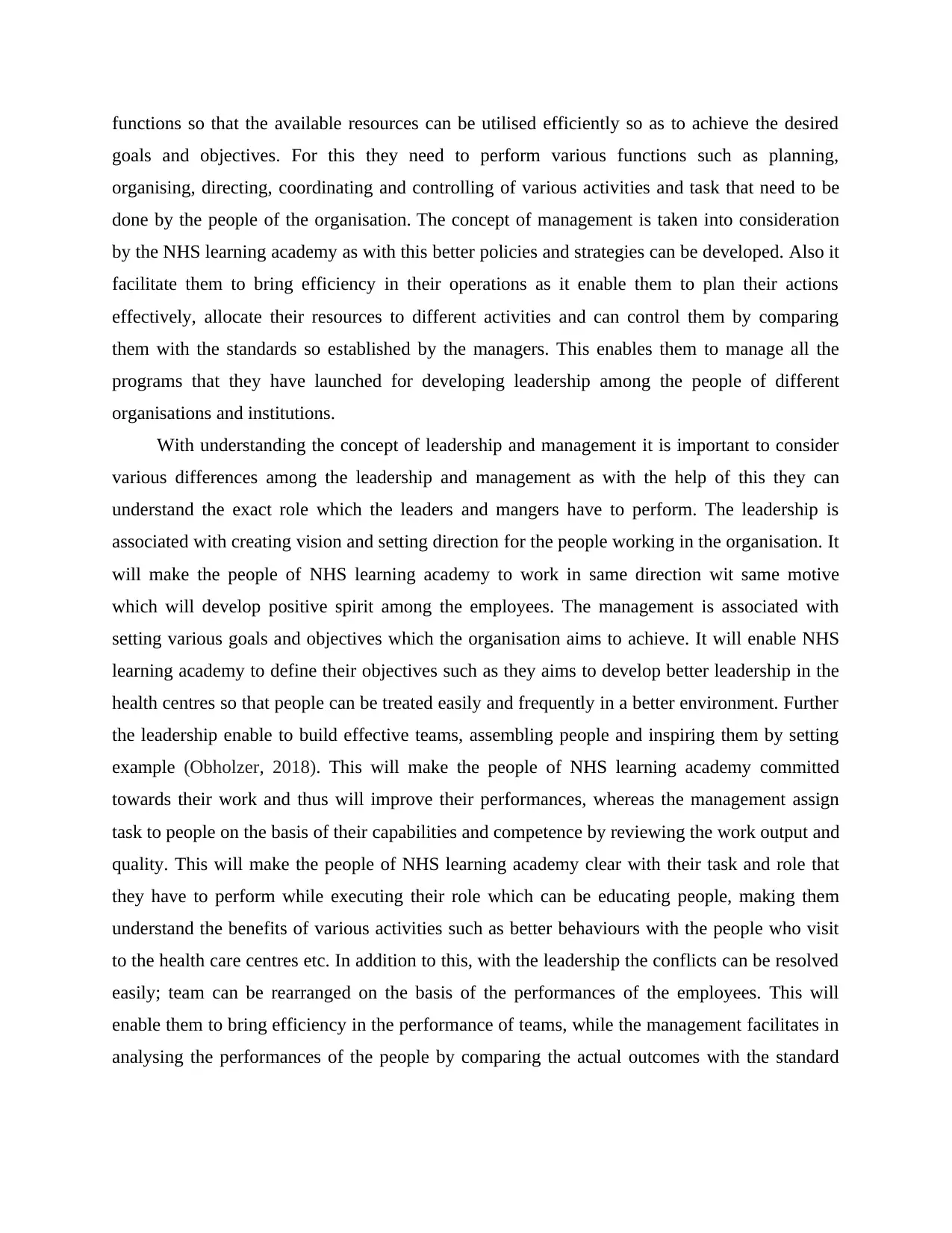
functions so that the available resources can be utilised efficiently so as to achieve the desired
goals and objectives. For this they need to perform various functions such as planning,
organising, directing, coordinating and controlling of various activities and task that need to be
done by the people of the organisation. The concept of management is taken into consideration
by the NHS learning academy as with this better policies and strategies can be developed. Also it
facilitate them to bring efficiency in their operations as it enable them to plan their actions
effectively, allocate their resources to different activities and can control them by comparing
them with the standards so established by the managers. This enables them to manage all the
programs that they have launched for developing leadership among the people of different
organisations and institutions.
With understanding the concept of leadership and management it is important to consider
various differences among the leadership and management as with the help of this they can
understand the exact role which the leaders and mangers have to perform. The leadership is
associated with creating vision and setting direction for the people working in the organisation. It
will make the people of NHS learning academy to work in same direction wit same motive
which will develop positive spirit among the employees. The management is associated with
setting various goals and objectives which the organisation aims to achieve. It will enable NHS
learning academy to define their objectives such as they aims to develop better leadership in the
health centres so that people can be treated easily and frequently in a better environment. Further
the leadership enable to build effective teams, assembling people and inspiring them by setting
example (Obholzer, 2018). This will make the people of NHS learning academy committed
towards their work and thus will improve their performances, whereas the management assign
task to people on the basis of their capabilities and competence by reviewing the work output and
quality. This will make the people of NHS learning academy clear with their task and role that
they have to perform while executing their role which can be educating people, making them
understand the benefits of various activities such as better behaviours with the people who visit
to the health care centres etc. In addition to this, with the leadership the conflicts can be resolved
easily; team can be rearranged on the basis of the performances of the employees. This will
enable them to bring efficiency in the performance of teams, while the management facilitates in
analysing the performances of the people by comparing the actual outcomes with the standard
goals and objectives. For this they need to perform various functions such as planning,
organising, directing, coordinating and controlling of various activities and task that need to be
done by the people of the organisation. The concept of management is taken into consideration
by the NHS learning academy as with this better policies and strategies can be developed. Also it
facilitate them to bring efficiency in their operations as it enable them to plan their actions
effectively, allocate their resources to different activities and can control them by comparing
them with the standards so established by the managers. This enables them to manage all the
programs that they have launched for developing leadership among the people of different
organisations and institutions.
With understanding the concept of leadership and management it is important to consider
various differences among the leadership and management as with the help of this they can
understand the exact role which the leaders and mangers have to perform. The leadership is
associated with creating vision and setting direction for the people working in the organisation. It
will make the people of NHS learning academy to work in same direction wit same motive
which will develop positive spirit among the employees. The management is associated with
setting various goals and objectives which the organisation aims to achieve. It will enable NHS
learning academy to define their objectives such as they aims to develop better leadership in the
health centres so that people can be treated easily and frequently in a better environment. Further
the leadership enable to build effective teams, assembling people and inspiring them by setting
example (Obholzer, 2018). This will make the people of NHS learning academy committed
towards their work and thus will improve their performances, whereas the management assign
task to people on the basis of their capabilities and competence by reviewing the work output and
quality. This will make the people of NHS learning academy clear with their task and role that
they have to perform while executing their role which can be educating people, making them
understand the benefits of various activities such as better behaviours with the people who visit
to the health care centres etc. In addition to this, with the leadership the conflicts can be resolved
easily; team can be rearranged on the basis of the performances of the employees. This will
enable them to bring efficiency in the performance of teams, while the management facilitates in
analysing the performances of the people by comparing the actual outcomes with the standard
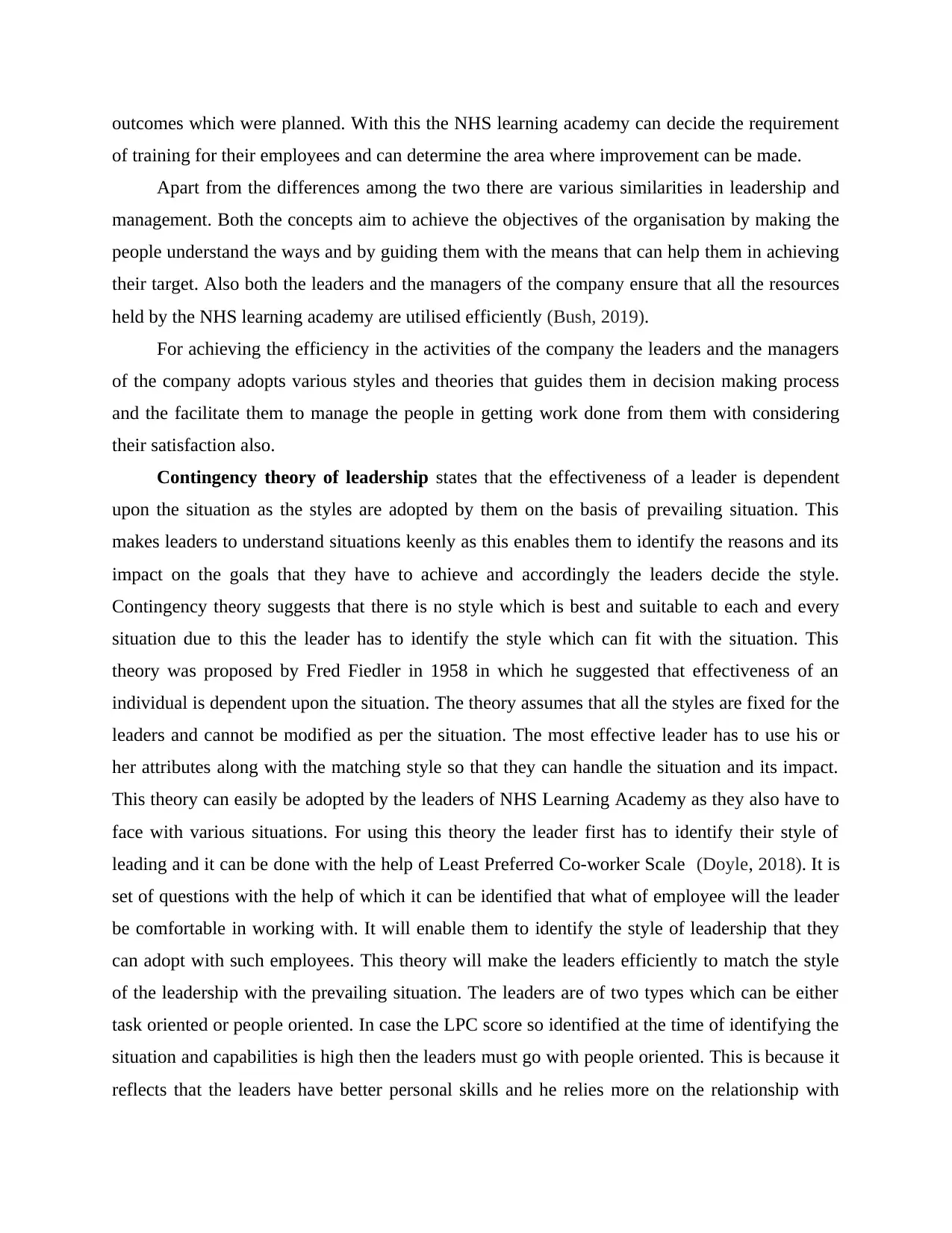
outcomes which were planned. With this the NHS learning academy can decide the requirement
of training for their employees and can determine the area where improvement can be made.
Apart from the differences among the two there are various similarities in leadership and
management. Both the concepts aim to achieve the objectives of the organisation by making the
people understand the ways and by guiding them with the means that can help them in achieving
their target. Also both the leaders and the managers of the company ensure that all the resources
held by the NHS learning academy are utilised efficiently (Bush, 2019).
For achieving the efficiency in the activities of the company the leaders and the managers
of the company adopts various styles and theories that guides them in decision making process
and the facilitate them to manage the people in getting work done from them with considering
their satisfaction also.
Contingency theory of leadership states that the effectiveness of a leader is dependent
upon the situation as the styles are adopted by them on the basis of prevailing situation. This
makes leaders to understand situations keenly as this enables them to identify the reasons and its
impact on the goals that they have to achieve and accordingly the leaders decide the style.
Contingency theory suggests that there is no style which is best and suitable to each and every
situation due to this the leader has to identify the style which can fit with the situation. This
theory was proposed by Fred Fiedler in 1958 in which he suggested that effectiveness of an
individual is dependent upon the situation. The theory assumes that all the styles are fixed for the
leaders and cannot be modified as per the situation. The most effective leader has to use his or
her attributes along with the matching style so that they can handle the situation and its impact.
This theory can easily be adopted by the leaders of NHS Learning Academy as they also have to
face with various situations. For using this theory the leader first has to identify their style of
leading and it can be done with the help of Least Preferred Co-worker Scale (Doyle, 2018). It is
set of questions with the help of which it can be identified that what of employee will the leader
be comfortable in working with. It will enable them to identify the style of leadership that they
can adopt with such employees. This theory will make the leaders efficiently to match the style
of the leadership with the prevailing situation. The leaders are of two types which can be either
task oriented or people oriented. In case the LPC score so identified at the time of identifying the
situation and capabilities is high then the leaders must go with people oriented. This is because it
reflects that the leaders have better personal skills and he relies more on the relationship with
of training for their employees and can determine the area where improvement can be made.
Apart from the differences among the two there are various similarities in leadership and
management. Both the concepts aim to achieve the objectives of the organisation by making the
people understand the ways and by guiding them with the means that can help them in achieving
their target. Also both the leaders and the managers of the company ensure that all the resources
held by the NHS learning academy are utilised efficiently (Bush, 2019).
For achieving the efficiency in the activities of the company the leaders and the managers
of the company adopts various styles and theories that guides them in decision making process
and the facilitate them to manage the people in getting work done from them with considering
their satisfaction also.
Contingency theory of leadership states that the effectiveness of a leader is dependent
upon the situation as the styles are adopted by them on the basis of prevailing situation. This
makes leaders to understand situations keenly as this enables them to identify the reasons and its
impact on the goals that they have to achieve and accordingly the leaders decide the style.
Contingency theory suggests that there is no style which is best and suitable to each and every
situation due to this the leader has to identify the style which can fit with the situation. This
theory was proposed by Fred Fiedler in 1958 in which he suggested that effectiveness of an
individual is dependent upon the situation. The theory assumes that all the styles are fixed for the
leaders and cannot be modified as per the situation. The most effective leader has to use his or
her attributes along with the matching style so that they can handle the situation and its impact.
This theory can easily be adopted by the leaders of NHS Learning Academy as they also have to
face with various situations. For using this theory the leader first has to identify their style of
leading and it can be done with the help of Least Preferred Co-worker Scale (Doyle, 2018). It is
set of questions with the help of which it can be identified that what of employee will the leader
be comfortable in working with. It will enable them to identify the style of leadership that they
can adopt with such employees. This theory will make the leaders efficiently to match the style
of the leadership with the prevailing situation. The leaders are of two types which can be either
task oriented or people oriented. In case the LPC score so identified at the time of identifying the
situation and capabilities is high then the leaders must go with people oriented. This is because it
reflects that the leaders have better personal skills and he relies more on the relationship with
⊘ This is a preview!⊘
Do you want full access?
Subscribe today to unlock all pages.

Trusted by 1+ million students worldwide
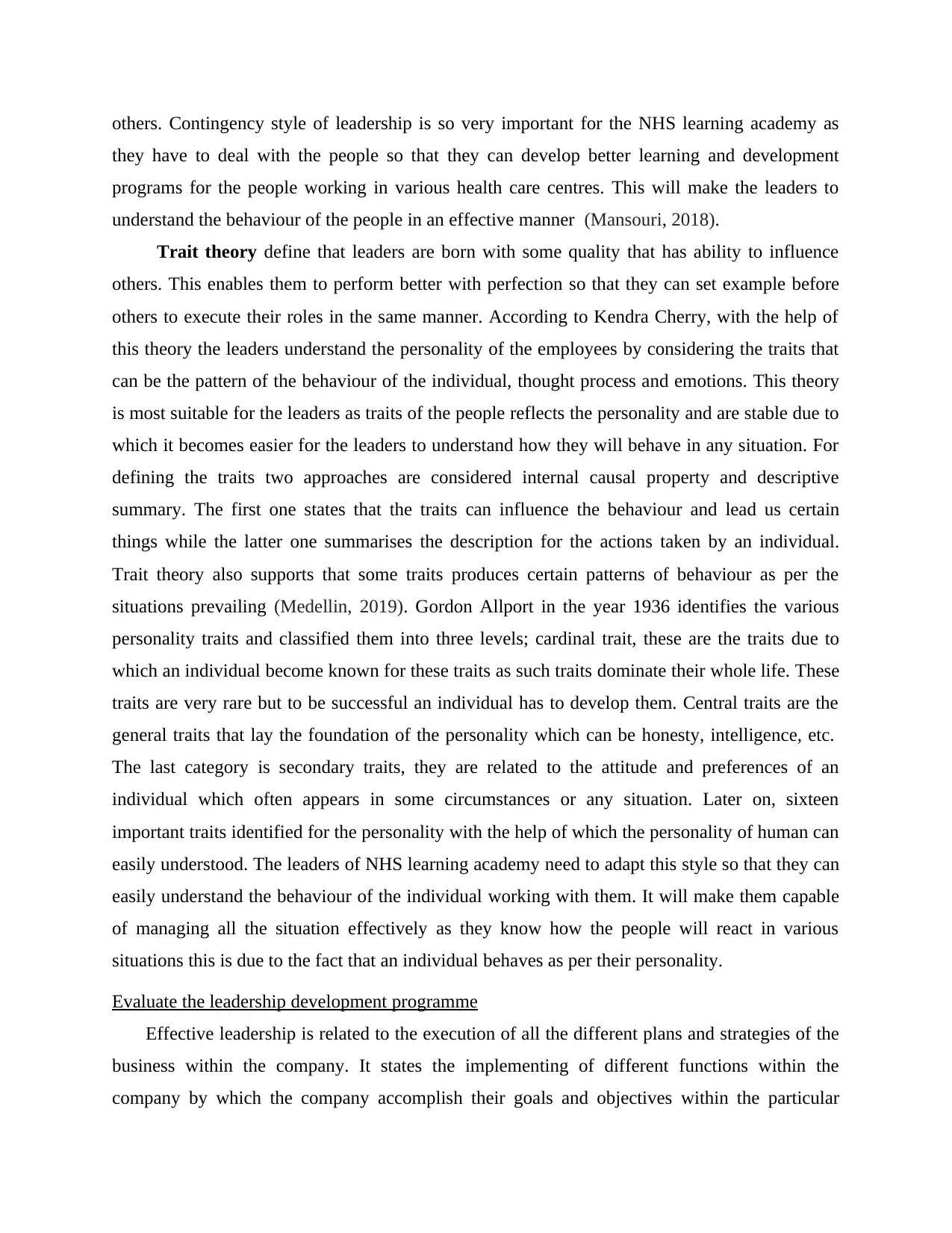
others. Contingency style of leadership is so very important for the NHS learning academy as
they have to deal with the people so that they can develop better learning and development
programs for the people working in various health care centres. This will make the leaders to
understand the behaviour of the people in an effective manner (Mansouri, 2018).
Trait theory define that leaders are born with some quality that has ability to influence
others. This enables them to perform better with perfection so that they can set example before
others to execute their roles in the same manner. According to Kendra Cherry, with the help of
this theory the leaders understand the personality of the employees by considering the traits that
can be the pattern of the behaviour of the individual, thought process and emotions. This theory
is most suitable for the leaders as traits of the people reflects the personality and are stable due to
which it becomes easier for the leaders to understand how they will behave in any situation. For
defining the traits two approaches are considered internal causal property and descriptive
summary. The first one states that the traits can influence the behaviour and lead us certain
things while the latter one summarises the description for the actions taken by an individual.
Trait theory also supports that some traits produces certain patterns of behaviour as per the
situations prevailing (Medellin, 2019). Gordon Allport in the year 1936 identifies the various
personality traits and classified them into three levels; cardinal trait, these are the traits due to
which an individual become known for these traits as such traits dominate their whole life. These
traits are very rare but to be successful an individual has to develop them. Central traits are the
general traits that lay the foundation of the personality which can be honesty, intelligence, etc.
The last category is secondary traits, they are related to the attitude and preferences of an
individual which often appears in some circumstances or any situation. Later on, sixteen
important traits identified for the personality with the help of which the personality of human can
easily understood. The leaders of NHS learning academy need to adapt this style so that they can
easily understand the behaviour of the individual working with them. It will make them capable
of managing all the situation effectively as they know how the people will react in various
situations this is due to the fact that an individual behaves as per their personality.
Evaluate the leadership development programme
Effective leadership is related to the execution of all the different plans and strategies of the
business within the company. It states the implementing of different functions within the
company by which the company accomplish their goals and objectives within the particular
they have to deal with the people so that they can develop better learning and development
programs for the people working in various health care centres. This will make the leaders to
understand the behaviour of the people in an effective manner (Mansouri, 2018).
Trait theory define that leaders are born with some quality that has ability to influence
others. This enables them to perform better with perfection so that they can set example before
others to execute their roles in the same manner. According to Kendra Cherry, with the help of
this theory the leaders understand the personality of the employees by considering the traits that
can be the pattern of the behaviour of the individual, thought process and emotions. This theory
is most suitable for the leaders as traits of the people reflects the personality and are stable due to
which it becomes easier for the leaders to understand how they will behave in any situation. For
defining the traits two approaches are considered internal causal property and descriptive
summary. The first one states that the traits can influence the behaviour and lead us certain
things while the latter one summarises the description for the actions taken by an individual.
Trait theory also supports that some traits produces certain patterns of behaviour as per the
situations prevailing (Medellin, 2019). Gordon Allport in the year 1936 identifies the various
personality traits and classified them into three levels; cardinal trait, these are the traits due to
which an individual become known for these traits as such traits dominate their whole life. These
traits are very rare but to be successful an individual has to develop them. Central traits are the
general traits that lay the foundation of the personality which can be honesty, intelligence, etc.
The last category is secondary traits, they are related to the attitude and preferences of an
individual which often appears in some circumstances or any situation. Later on, sixteen
important traits identified for the personality with the help of which the personality of human can
easily understood. The leaders of NHS learning academy need to adapt this style so that they can
easily understand the behaviour of the individual working with them. It will make them capable
of managing all the situation effectively as they know how the people will react in various
situations this is due to the fact that an individual behaves as per their personality.
Evaluate the leadership development programme
Effective leadership is related to the execution of all the different plans and strategies of the
business within the company. It states the implementing of different functions within the
company by which the company accomplish their goals and objectives within the particular
Paraphrase This Document
Need a fresh take? Get an instant paraphrase of this document with our AI Paraphraser
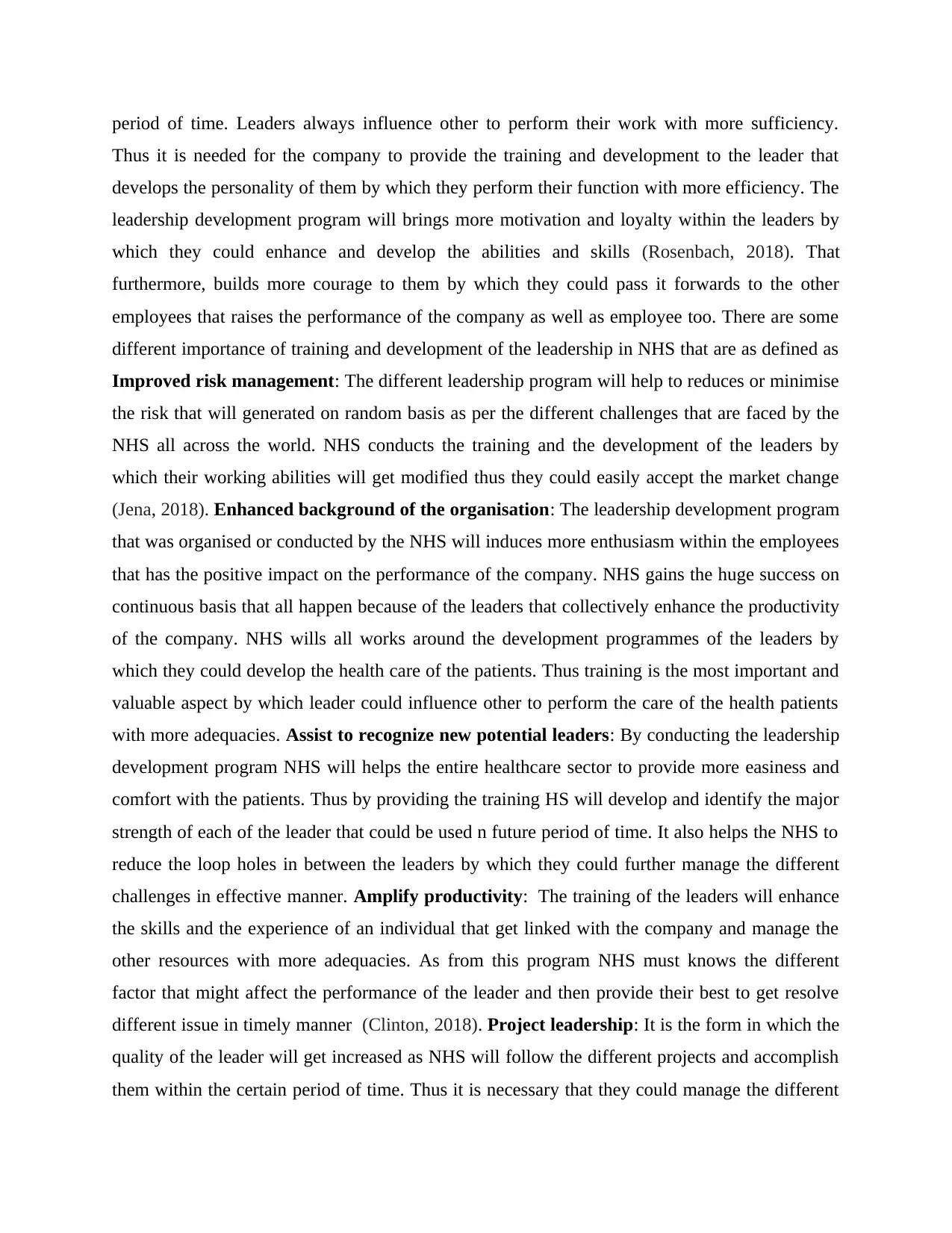
period of time. Leaders always influence other to perform their work with more sufficiency.
Thus it is needed for the company to provide the training and development to the leader that
develops the personality of them by which they perform their function with more efficiency. The
leadership development program will brings more motivation and loyalty within the leaders by
which they could enhance and develop the abilities and skills (Rosenbach, 2018). That
furthermore, builds more courage to them by which they could pass it forwards to the other
employees that raises the performance of the company as well as employee too. There are some
different importance of training and development of the leadership in NHS that are as defined as
Improved risk management: The different leadership program will help to reduces or minimise
the risk that will generated on random basis as per the different challenges that are faced by the
NHS all across the world. NHS conducts the training and the development of the leaders by
which their working abilities will get modified thus they could easily accept the market change
(Jena, 2018). Enhanced background of the organisation: The leadership development program
that was organised or conducted by the NHS will induces more enthusiasm within the employees
that has the positive impact on the performance of the company. NHS gains the huge success on
continuous basis that all happen because of the leaders that collectively enhance the productivity
of the company. NHS wills all works around the development programmes of the leaders by
which they could develop the health care of the patients. Thus training is the most important and
valuable aspect by which leader could influence other to perform the care of the health patients
with more adequacies. Assist to recognize new potential leaders: By conducting the leadership
development program NHS will helps the entire healthcare sector to provide more easiness and
comfort with the patients. Thus by providing the training HS will develop and identify the major
strength of each of the leader that could be used n future period of time. It also helps the NHS to
reduce the loop holes in between the leaders by which they could further manage the different
challenges in effective manner. Amplify productivity: The training of the leaders will enhance
the skills and the experience of an individual that get linked with the company and manage the
other resources with more adequacies. As from this program NHS must knows the different
factor that might affect the performance of the leader and then provide their best to get resolve
different issue in timely manner (Clinton, 2018). Project leadership: It is the form in which the
quality of the leader will get increased as NHS will follow the different projects and accomplish
them within the certain period of time. Thus it is necessary that they could manage the different
Thus it is needed for the company to provide the training and development to the leader that
develops the personality of them by which they perform their function with more efficiency. The
leadership development program will brings more motivation and loyalty within the leaders by
which they could enhance and develop the abilities and skills (Rosenbach, 2018). That
furthermore, builds more courage to them by which they could pass it forwards to the other
employees that raises the performance of the company as well as employee too. There are some
different importance of training and development of the leadership in NHS that are as defined as
Improved risk management: The different leadership program will help to reduces or minimise
the risk that will generated on random basis as per the different challenges that are faced by the
NHS all across the world. NHS conducts the training and the development of the leaders by
which their working abilities will get modified thus they could easily accept the market change
(Jena, 2018). Enhanced background of the organisation: The leadership development program
that was organised or conducted by the NHS will induces more enthusiasm within the employees
that has the positive impact on the performance of the company. NHS gains the huge success on
continuous basis that all happen because of the leaders that collectively enhance the productivity
of the company. NHS wills all works around the development programmes of the leaders by
which they could develop the health care of the patients. Thus training is the most important and
valuable aspect by which leader could influence other to perform the care of the health patients
with more adequacies. Assist to recognize new potential leaders: By conducting the leadership
development program NHS will helps the entire healthcare sector to provide more easiness and
comfort with the patients. Thus by providing the training HS will develop and identify the major
strength of each of the leader that could be used n future period of time. It also helps the NHS to
reduce the loop holes in between the leaders by which they could further manage the different
challenges in effective manner. Amplify productivity: The training of the leaders will enhance
the skills and the experience of an individual that get linked with the company and manage the
other resources with more adequacies. As from this program NHS must knows the different
factor that might affect the performance of the leader and then provide their best to get resolve
different issue in timely manner (Clinton, 2018). Project leadership: It is the form in which the
quality of the leader will get increased as NHS will follow the different projects and accomplish
them within the certain period of time. Thus it is necessary that they could manage the different
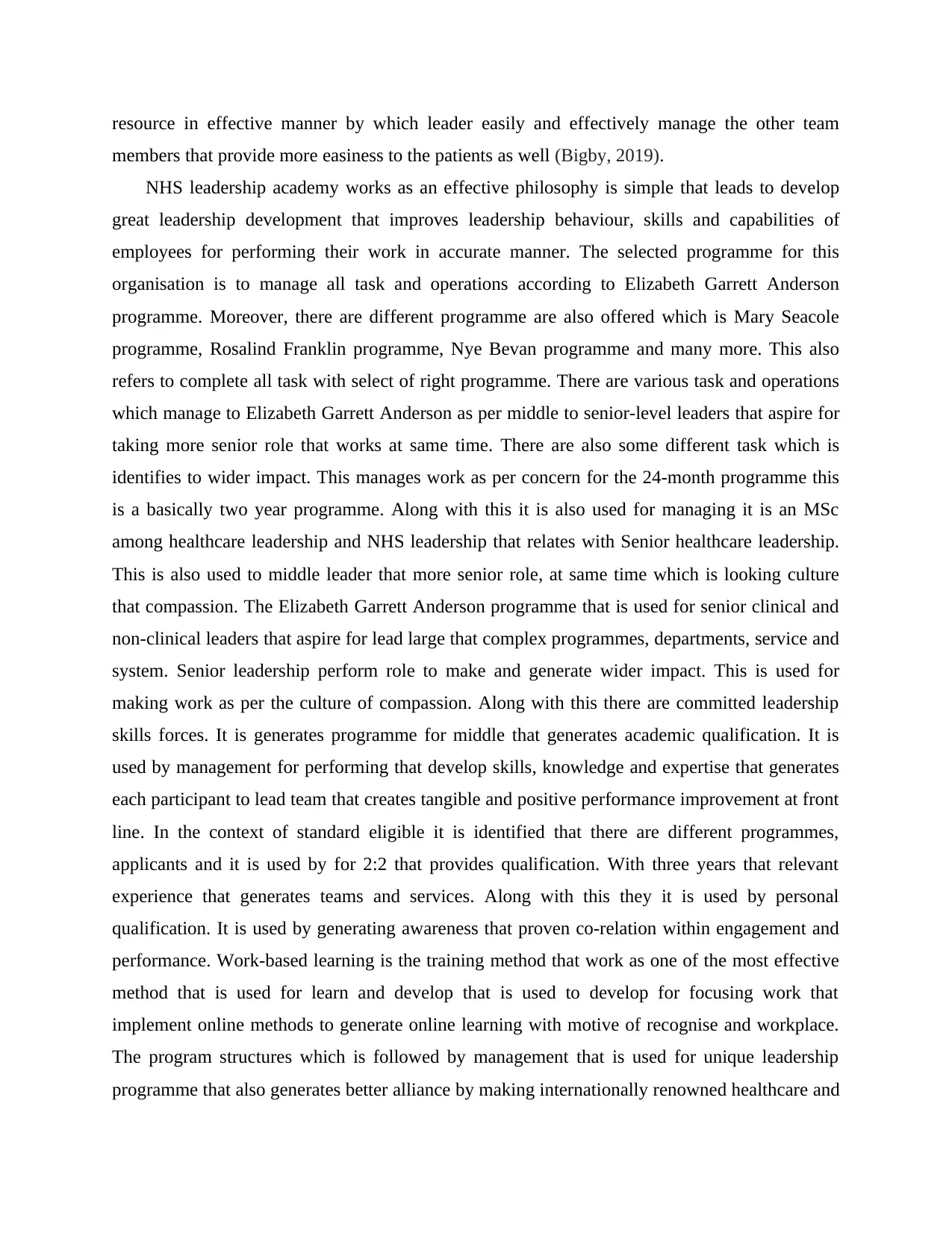
resource in effective manner by which leader easily and effectively manage the other team
members that provide more easiness to the patients as well (Bigby, 2019).
NHS leadership academy works as an effective philosophy is simple that leads to develop
great leadership development that improves leadership behaviour, skills and capabilities of
employees for performing their work in accurate manner. The selected programme for this
organisation is to manage all task and operations according to Elizabeth Garrett Anderson
programme. Moreover, there are different programme are also offered which is Mary Seacole
programme, Rosalind Franklin programme, Nye Bevan programme and many more. This also
refers to complete all task with select of right programme. There are various task and operations
which manage to Elizabeth Garrett Anderson as per middle to senior-level leaders that aspire for
taking more senior role that works at same time. There are also some different task which is
identifies to wider impact. This manages work as per concern for the 24-month programme this
is a basically two year programme. Along with this it is also used for managing it is an MSc
among healthcare leadership and NHS leadership that relates with Senior healthcare leadership.
This is also used to middle leader that more senior role, at same time which is looking culture
that compassion. The Elizabeth Garrett Anderson programme that is used for senior clinical and
non-clinical leaders that aspire for lead large that complex programmes, departments, service and
system. Senior leadership perform role to make and generate wider impact. This is used for
making work as per the culture of compassion. Along with this there are committed leadership
skills forces. It is generates programme for middle that generates academic qualification. It is
used by management for performing that develop skills, knowledge and expertise that generates
each participant to lead team that creates tangible and positive performance improvement at front
line. In the context of standard eligible it is identified that there are different programmes,
applicants and it is used by for 2:2 that provides qualification. With three years that relevant
experience that generates teams and services. Along with this they it is used by personal
qualification. It is used by generating awareness that proven co-relation within engagement and
performance. Work-based learning is the training method that work as one of the most effective
method that is used for learn and develop that is used to develop for focusing work that
implement online methods to generate online learning with motive of recognise and workplace.
The program structures which is followed by management that is used for unique leadership
programme that also generates better alliance by making internationally renowned healthcare and
members that provide more easiness to the patients as well (Bigby, 2019).
NHS leadership academy works as an effective philosophy is simple that leads to develop
great leadership development that improves leadership behaviour, skills and capabilities of
employees for performing their work in accurate manner. The selected programme for this
organisation is to manage all task and operations according to Elizabeth Garrett Anderson
programme. Moreover, there are different programme are also offered which is Mary Seacole
programme, Rosalind Franklin programme, Nye Bevan programme and many more. This also
refers to complete all task with select of right programme. There are various task and operations
which manage to Elizabeth Garrett Anderson as per middle to senior-level leaders that aspire for
taking more senior role that works at same time. There are also some different task which is
identifies to wider impact. This manages work as per concern for the 24-month programme this
is a basically two year programme. Along with this it is also used for managing it is an MSc
among healthcare leadership and NHS leadership that relates with Senior healthcare leadership.
This is also used to middle leader that more senior role, at same time which is looking culture
that compassion. The Elizabeth Garrett Anderson programme that is used for senior clinical and
non-clinical leaders that aspire for lead large that complex programmes, departments, service and
system. Senior leadership perform role to make and generate wider impact. This is used for
making work as per the culture of compassion. Along with this there are committed leadership
skills forces. It is generates programme for middle that generates academic qualification. It is
used by management for performing that develop skills, knowledge and expertise that generates
each participant to lead team that creates tangible and positive performance improvement at front
line. In the context of standard eligible it is identified that there are different programmes,
applicants and it is used by for 2:2 that provides qualification. With three years that relevant
experience that generates teams and services. Along with this they it is used by personal
qualification. It is used by generating awareness that proven co-relation within engagement and
performance. Work-based learning is the training method that work as one of the most effective
method that is used for learn and develop that is used to develop for focusing work that
implement online methods to generate online learning with motive of recognise and workplace.
The program structures which is followed by management that is used for unique leadership
programme that also generates better alliance by making internationally renowned healthcare and
⊘ This is a preview!⊘
Do you want full access?
Subscribe today to unlock all pages.

Trusted by 1+ million students worldwide
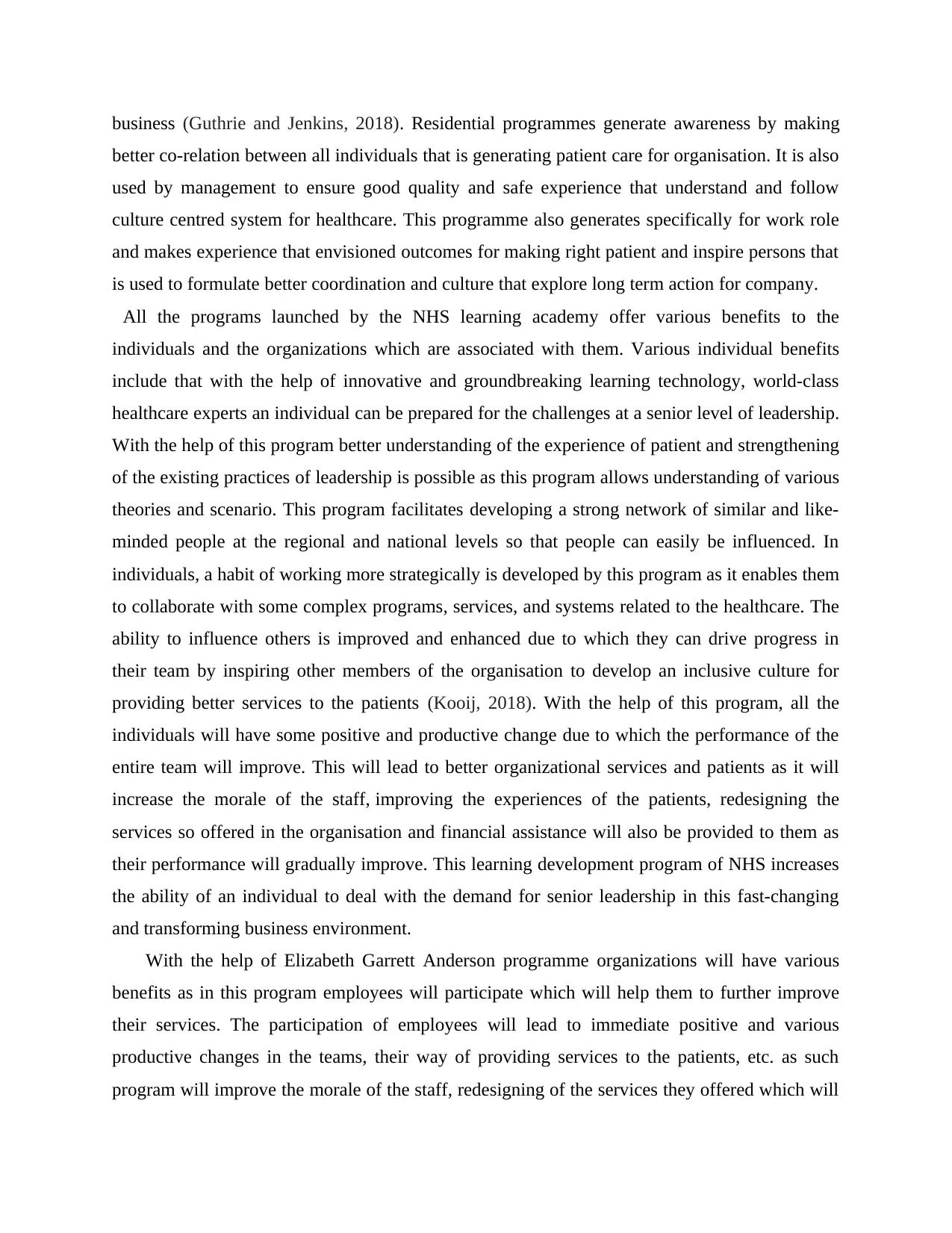
business (Guthrie and Jenkins, 2018). Residential programmes generate awareness by making
better co-relation between all individuals that is generating patient care for organisation. It is also
used by management to ensure good quality and safe experience that understand and follow
culture centred system for healthcare. This programme also generates specifically for work role
and makes experience that envisioned outcomes for making right patient and inspire persons that
is used to formulate better coordination and culture that explore long term action for company.
All the programs launched by the NHS learning academy offer various benefits to the
individuals and the organizations which are associated with them. Various individual benefits
include that with the help of innovative and groundbreaking learning technology, world-class
healthcare experts an individual can be prepared for the challenges at a senior level of leadership.
With the help of this program better understanding of the experience of patient and strengthening
of the existing practices of leadership is possible as this program allows understanding of various
theories and scenario. This program facilitates developing a strong network of similar and like-
minded people at the regional and national levels so that people can easily be influenced. In
individuals, a habit of working more strategically is developed by this program as it enables them
to collaborate with some complex programs, services, and systems related to the healthcare. The
ability to influence others is improved and enhanced due to which they can drive progress in
their team by inspiring other members of the organisation to develop an inclusive culture for
providing better services to the patients (Kooij, 2018). With the help of this program, all the
individuals will have some positive and productive change due to which the performance of the
entire team will improve. This will lead to better organizational services and patients as it will
increase the morale of the staff, improving the experiences of the patients, redesigning the
services so offered in the organisation and financial assistance will also be provided to them as
their performance will gradually improve. This learning development program of NHS increases
the ability of an individual to deal with the demand for senior leadership in this fast-changing
and transforming business environment.
With the help of Elizabeth Garrett Anderson programme organizations will have various
benefits as in this program employees will participate which will help them to further improve
their services. The participation of employees will lead to immediate positive and various
productive changes in the teams, their way of providing services to the patients, etc. as such
program will improve the morale of the staff, redesigning of the services they offered which will
better co-relation between all individuals that is generating patient care for organisation. It is also
used by management to ensure good quality and safe experience that understand and follow
culture centred system for healthcare. This programme also generates specifically for work role
and makes experience that envisioned outcomes for making right patient and inspire persons that
is used to formulate better coordination and culture that explore long term action for company.
All the programs launched by the NHS learning academy offer various benefits to the
individuals and the organizations which are associated with them. Various individual benefits
include that with the help of innovative and groundbreaking learning technology, world-class
healthcare experts an individual can be prepared for the challenges at a senior level of leadership.
With the help of this program better understanding of the experience of patient and strengthening
of the existing practices of leadership is possible as this program allows understanding of various
theories and scenario. This program facilitates developing a strong network of similar and like-
minded people at the regional and national levels so that people can easily be influenced. In
individuals, a habit of working more strategically is developed by this program as it enables them
to collaborate with some complex programs, services, and systems related to the healthcare. The
ability to influence others is improved and enhanced due to which they can drive progress in
their team by inspiring other members of the organisation to develop an inclusive culture for
providing better services to the patients (Kooij, 2018). With the help of this program, all the
individuals will have some positive and productive change due to which the performance of the
entire team will improve. This will lead to better organizational services and patients as it will
increase the morale of the staff, improving the experiences of the patients, redesigning the
services so offered in the organisation and financial assistance will also be provided to them as
their performance will gradually improve. This learning development program of NHS increases
the ability of an individual to deal with the demand for senior leadership in this fast-changing
and transforming business environment.
With the help of Elizabeth Garrett Anderson programme organizations will have various
benefits as in this program employees will participate which will help them to further improve
their services. The participation of employees will lead to immediate positive and various
productive changes in the teams, their way of providing services to the patients, etc. as such
program will improve the morale of the staff, redesigning of the services they offered which will
Paraphrase This Document
Need a fresh take? Get an instant paraphrase of this document with our AI Paraphraser
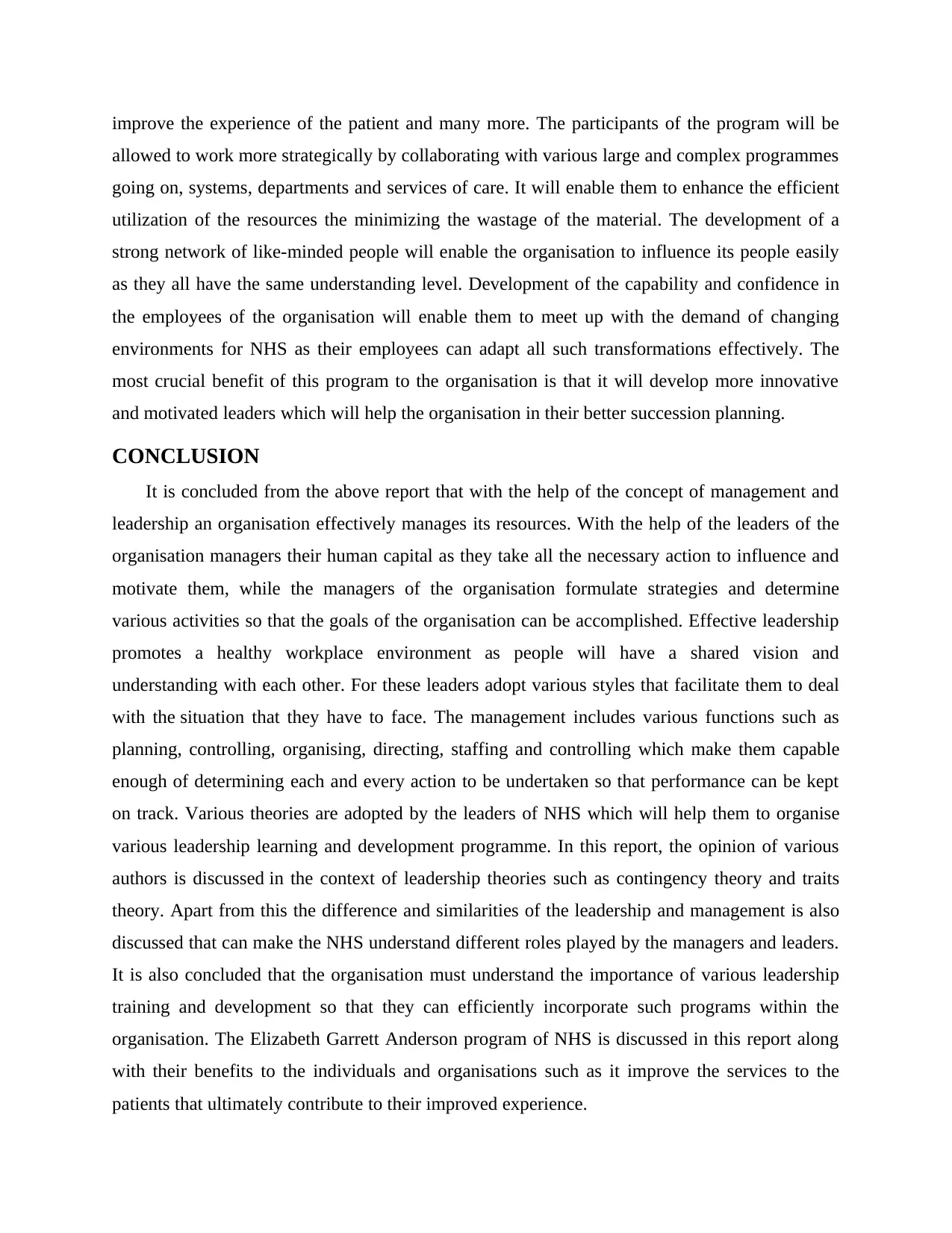
improve the experience of the patient and many more. The participants of the program will be
allowed to work more strategically by collaborating with various large and complex programmes
going on, systems, departments and services of care. It will enable them to enhance the efficient
utilization of the resources the minimizing the wastage of the material. The development of a
strong network of like-minded people will enable the organisation to influence its people easily
as they all have the same understanding level. Development of the capability and confidence in
the employees of the organisation will enable them to meet up with the demand of changing
environments for NHS as their employees can adapt all such transformations effectively. The
most crucial benefit of this program to the organisation is that it will develop more innovative
and motivated leaders which will help the organisation in their better succession planning.
CONCLUSION
It is concluded from the above report that with the help of the concept of management and
leadership an organisation effectively manages its resources. With the help of the leaders of the
organisation managers their human capital as they take all the necessary action to influence and
motivate them, while the managers of the organisation formulate strategies and determine
various activities so that the goals of the organisation can be accomplished. Effective leadership
promotes a healthy workplace environment as people will have a shared vision and
understanding with each other. For these leaders adopt various styles that facilitate them to deal
with the situation that they have to face. The management includes various functions such as
planning, controlling, organising, directing, staffing and controlling which make them capable
enough of determining each and every action to be undertaken so that performance can be kept
on track. Various theories are adopted by the leaders of NHS which will help them to organise
various leadership learning and development programme. In this report, the opinion of various
authors is discussed in the context of leadership theories such as contingency theory and traits
theory. Apart from this the difference and similarities of the leadership and management is also
discussed that can make the NHS understand different roles played by the managers and leaders.
It is also concluded that the organisation must understand the importance of various leadership
training and development so that they can efficiently incorporate such programs within the
organisation. The Elizabeth Garrett Anderson program of NHS is discussed in this report along
with their benefits to the individuals and organisations such as it improve the services to the
patients that ultimately contribute to their improved experience.
allowed to work more strategically by collaborating with various large and complex programmes
going on, systems, departments and services of care. It will enable them to enhance the efficient
utilization of the resources the minimizing the wastage of the material. The development of a
strong network of like-minded people will enable the organisation to influence its people easily
as they all have the same understanding level. Development of the capability and confidence in
the employees of the organisation will enable them to meet up with the demand of changing
environments for NHS as their employees can adapt all such transformations effectively. The
most crucial benefit of this program to the organisation is that it will develop more innovative
and motivated leaders which will help the organisation in their better succession planning.
CONCLUSION
It is concluded from the above report that with the help of the concept of management and
leadership an organisation effectively manages its resources. With the help of the leaders of the
organisation managers their human capital as they take all the necessary action to influence and
motivate them, while the managers of the organisation formulate strategies and determine
various activities so that the goals of the organisation can be accomplished. Effective leadership
promotes a healthy workplace environment as people will have a shared vision and
understanding with each other. For these leaders adopt various styles that facilitate them to deal
with the situation that they have to face. The management includes various functions such as
planning, controlling, organising, directing, staffing and controlling which make them capable
enough of determining each and every action to be undertaken so that performance can be kept
on track. Various theories are adopted by the leaders of NHS which will help them to organise
various leadership learning and development programme. In this report, the opinion of various
authors is discussed in the context of leadership theories such as contingency theory and traits
theory. Apart from this the difference and similarities of the leadership and management is also
discussed that can make the NHS understand different roles played by the managers and leaders.
It is also concluded that the organisation must understand the importance of various leadership
training and development so that they can efficiently incorporate such programs within the
organisation. The Elizabeth Garrett Anderson program of NHS is discussed in this report along
with their benefits to the individuals and organisations such as it improve the services to the
patients that ultimately contribute to their improved experience.
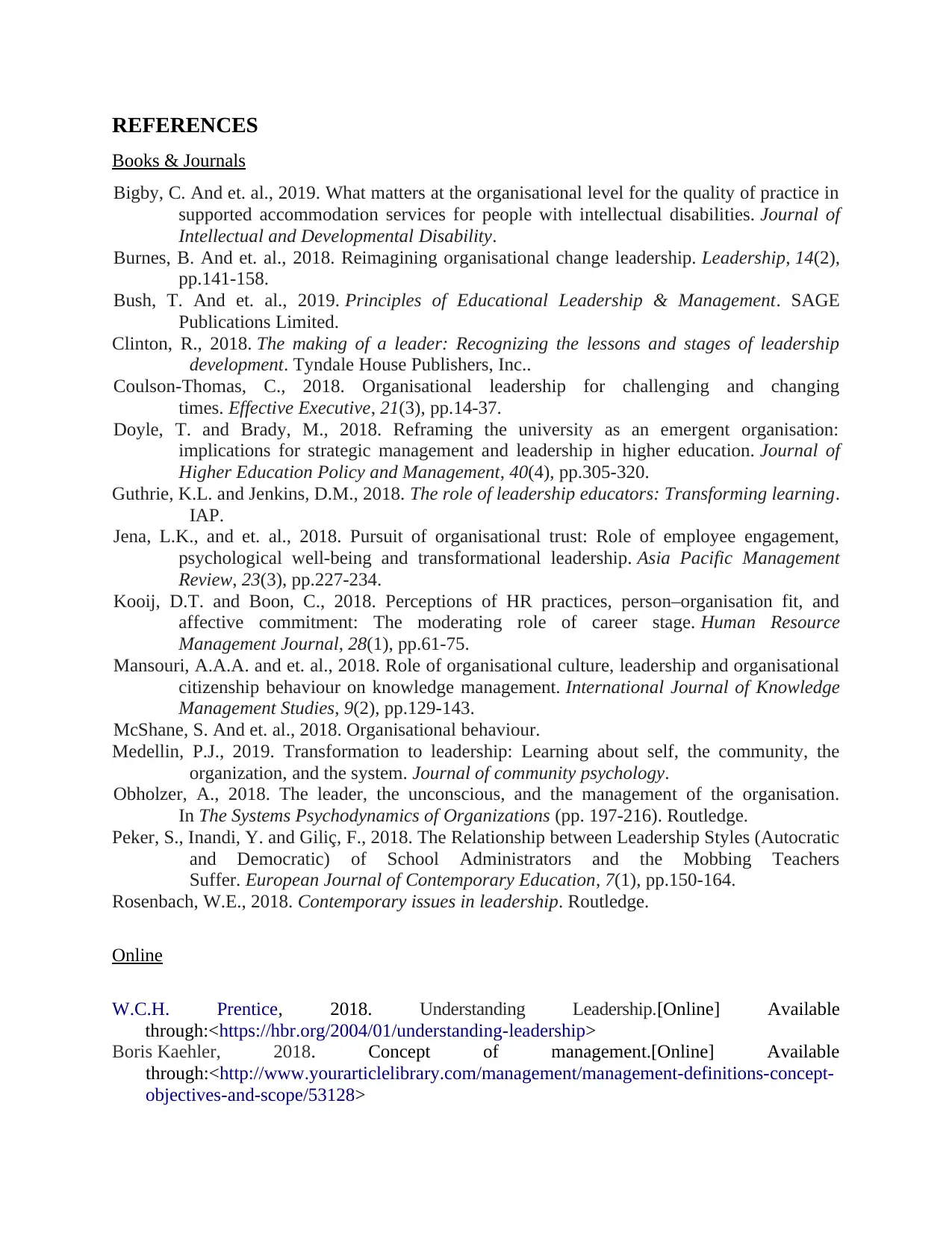
REFERENCES
Books & Journals
Bigby, C. And et. al., 2019. What matters at the organisational level for the quality of practice in
supported accommodation services for people with intellectual disabilities. Journal of
Intellectual and Developmental Disability.
Burnes, B. And et. al., 2018. Reimagining organisational change leadership. Leadership, 14(2),
pp.141-158.
Bush, T. And et. al., 2019. Principles of Educational Leadership & Management. SAGE
Publications Limited.
Clinton, R., 2018. The making of a leader: Recognizing the lessons and stages of leadership
development. Tyndale House Publishers, Inc..
Coulson-Thomas, C., 2018. Organisational leadership for challenging and changing
times. Effective Executive, 21(3), pp.14-37.
Doyle, T. and Brady, M., 2018. Reframing the university as an emergent organisation:
implications for strategic management and leadership in higher education. Journal of
Higher Education Policy and Management, 40(4), pp.305-320.
Guthrie, K.L. and Jenkins, D.M., 2018. The role of leadership educators: Transforming learning.
IAP.
Jena, L.K., and et. al., 2018. Pursuit of organisational trust: Role of employee engagement,
psychological well-being and transformational leadership. Asia Pacific Management
Review, 23(3), pp.227-234.
Kooij, D.T. and Boon, C., 2018. Perceptions of HR practices, person–organisation fit, and
affective commitment: The moderating role of career stage. Human Resource
Management Journal, 28(1), pp.61-75.
Mansouri, A.A.A. and et. al., 2018. Role of organisational culture, leadership and organisational
citizenship behaviour on knowledge management. International Journal of Knowledge
Management Studies, 9(2), pp.129-143.
McShane, S. And et. al., 2018. Organisational behaviour.
Medellin, P.J., 2019. Transformation to leadership: Learning about self, the community, the
organization, and the system. Journal of community psychology.
Obholzer, A., 2018. The leader, the unconscious, and the management of the organisation.
In The Systems Psychodynamics of Organizations (pp. 197-216). Routledge.
Peker, S., Inandi, Y. and Giliç, F., 2018. The Relationship between Leadership Styles (Autocratic
and Democratic) of School Administrators and the Mobbing Teachers
Suffer. European Journal of Contemporary Education, 7(1), pp.150-164.
Rosenbach, W.E., 2018. Contemporary issues in leadership. Routledge.
Online
W.C.H. Prentice, 2018. Understanding Leadership.[Online] Available
through:<https://hbr.org/2004/01/understanding-leadership>
Boris Kaehler, 2018. Concept of management.[Online] Available
through:<http://www.yourarticlelibrary.com/management/management-definitions-concept-
objectives-and-scope/53128>
Books & Journals
Bigby, C. And et. al., 2019. What matters at the organisational level for the quality of practice in
supported accommodation services for people with intellectual disabilities. Journal of
Intellectual and Developmental Disability.
Burnes, B. And et. al., 2018. Reimagining organisational change leadership. Leadership, 14(2),
pp.141-158.
Bush, T. And et. al., 2019. Principles of Educational Leadership & Management. SAGE
Publications Limited.
Clinton, R., 2018. The making of a leader: Recognizing the lessons and stages of leadership
development. Tyndale House Publishers, Inc..
Coulson-Thomas, C., 2018. Organisational leadership for challenging and changing
times. Effective Executive, 21(3), pp.14-37.
Doyle, T. and Brady, M., 2018. Reframing the university as an emergent organisation:
implications for strategic management and leadership in higher education. Journal of
Higher Education Policy and Management, 40(4), pp.305-320.
Guthrie, K.L. and Jenkins, D.M., 2018. The role of leadership educators: Transforming learning.
IAP.
Jena, L.K., and et. al., 2018. Pursuit of organisational trust: Role of employee engagement,
psychological well-being and transformational leadership. Asia Pacific Management
Review, 23(3), pp.227-234.
Kooij, D.T. and Boon, C., 2018. Perceptions of HR practices, person–organisation fit, and
affective commitment: The moderating role of career stage. Human Resource
Management Journal, 28(1), pp.61-75.
Mansouri, A.A.A. and et. al., 2018. Role of organisational culture, leadership and organisational
citizenship behaviour on knowledge management. International Journal of Knowledge
Management Studies, 9(2), pp.129-143.
McShane, S. And et. al., 2018. Organisational behaviour.
Medellin, P.J., 2019. Transformation to leadership: Learning about self, the community, the
organization, and the system. Journal of community psychology.
Obholzer, A., 2018. The leader, the unconscious, and the management of the organisation.
In The Systems Psychodynamics of Organizations (pp. 197-216). Routledge.
Peker, S., Inandi, Y. and Giliç, F., 2018. The Relationship between Leadership Styles (Autocratic
and Democratic) of School Administrators and the Mobbing Teachers
Suffer. European Journal of Contemporary Education, 7(1), pp.150-164.
Rosenbach, W.E., 2018. Contemporary issues in leadership. Routledge.
Online
W.C.H. Prentice, 2018. Understanding Leadership.[Online] Available
through:<https://hbr.org/2004/01/understanding-leadership>
Boris Kaehler, 2018. Concept of management.[Online] Available
through:<http://www.yourarticlelibrary.com/management/management-definitions-concept-
objectives-and-scope/53128>
⊘ This is a preview!⊘
Do you want full access?
Subscribe today to unlock all pages.

Trusted by 1+ million students worldwide
1 out of 13
Related Documents
Your All-in-One AI-Powered Toolkit for Academic Success.
+13062052269
info@desklib.com
Available 24*7 on WhatsApp / Email
![[object Object]](/_next/static/media/star-bottom.7253800d.svg)
Unlock your academic potential
Copyright © 2020–2026 A2Z Services. All Rights Reserved. Developed and managed by ZUCOL.





